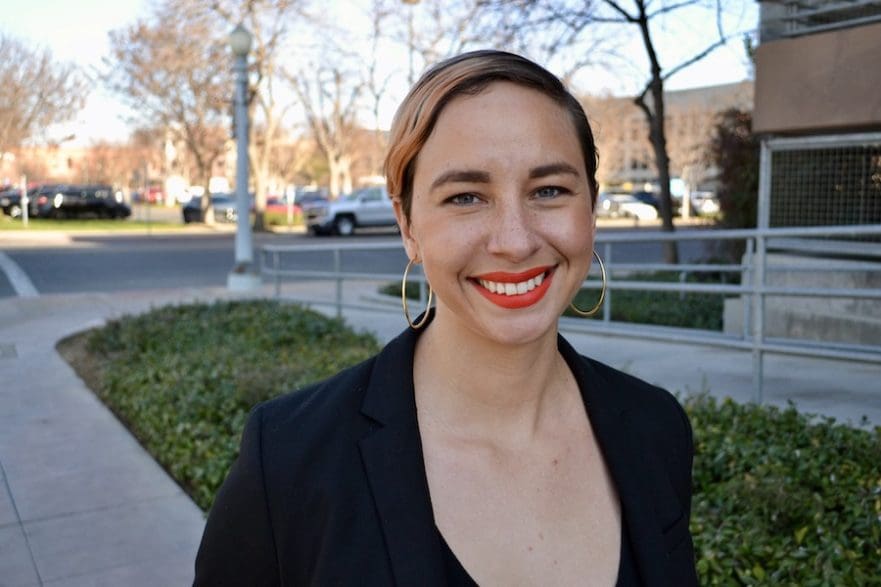If there’s any doubt that middle- and working-class residents all over California need stronger renter protections, one should visit Fresno, and look up Grecia Elenes, the earnest, yet amiable senior policy advocate at the Leadership Counsel for Justice & Accountability. Born and raised in Fresno, and a graduate of UC Berkeley, Elenes knows a thing or two.
“There’s a huge population of people experiencing homelessness that I didn’t see before,” Elenes tells me inside her brick-walled office in downtown Fresno. “We’re seeing it a lot more. It’s people who are down on their luck, who couldn’t pay a sudden rent increase or lost their job and couldn’t keep up with the rent. Rents are high and wages are stagnant around here.”
If that wasn’t bad enough, the people who somehow find a way to pay for a $200 per month rent increase (that’s a spike of $2,400 over the course of a year) are trapped in nightmare conditions, desperate to keep their homes.
“People are living in really substandard housing,” says Elenes. “Some folks tell us that cockroaches are crawling all over them and their children as they sleep. But there’s a fear of retaliation if they complain. Many people are undocumented. They don’t want to get into trouble, and they need housing.”
Elenes is 28 years old. Her father was a farm worker, and later turned into an entrepreneur. Her mother worked as a grocery store clerk. She grew up working class, and studied environmental science at Berkeley, where she learned more about international poverty and clean water problems in the Central Valley. Elenes landed a job with the state of California, then came back home to work for the Leadership Counsel, a social justice organization that works closely with vulnerable communities in the San Joaquin and Eastern Coachella valleys. She wanted to stand up for the lower-income people she grew up with.
“We believe that communities know best,” says Elenes, who, like many housing and social justice activists, is justifiably wary of the top-down policies routinely pushed by politicians, the real estate industry, and even the mainstream media. “We believe that they can come up with good solutions.”
If those policy makers and reporters talked to her, they’d learn that the Bay Area’s gentrification and housing affordability crises are now triggering higher rents in Fresno, nearly 200 miles away. They’d learn that gentrification and excessive rents have pushed working-class people east to Stockton, and then south, along Highway 99, to Modesto and Merced and Fresno. All of them constantly moving, trying to find cheaper places to live and decent jobs to cover the rent.
“The rents in Fresno are affordable for someone making $60,000 a year,” says Elenes, “but not for low-income people. Some are only making $10,000 a year.”
Many people can’t move anymore. They don’t know where else to go. The rent, as they say, is too damn high.
“If people could move,” says Elenes, “they would. But it still doesn’t solve the systemic issues that are at play here.”
Some of those systemic issues — in Fresno or Concord or El Cerrito or Sacramento or other cities in California — involve political indifference and the outsized influence of the real estate industry on local and state legislators. Many of those politicians push pro-gentrification, trickle-down, luxury-housing policies that enrich developers and landlords, but fuel gentrification, sudden evictions, and increasing homelessness.
“There’s a strong will [in Fresno] to not build affordable housing or mixed-income housing,” says Elenes. “The people who have the most money are developers and lobbying organizations. There’s a lack of political will to go against that.”
She adds, “The development industry has a real strong hold on City Hall.”
Among other community-based solutions, Elenes wants to see politicians prioritize the building of truly affordable housing over luxury housing; more quickly produce housing for the homeless; and implement rent control.
“We’re seeing people have their rent increased from one month to the next,” says Elenes. “$200 rent increases is not uncommon, unfortunately.”
Before she goes back to her advocacy work, Elenes lays it out for the politicians.
“The state really needs to establish and understand that housing is a human right,” she says. “It’s like a domino effect, like how the lack of clean drinking water has a domino effect. When young kids have a stable, affordable housing environment, which is a basic need, they can become a contributing citizen. They can become a teacher or an advocate or a doctor. If you don’t have that, then it’s very hard to achieve in school and contribute.”
Advocates on the frontlines understand this. Do the politicians? Or do they not even care? For advocates like Elenes, they’ve seen the damage caused by cheap talk and trickle-down, top-down solutions. Last year, more than 150,000 Californians were homeless.

